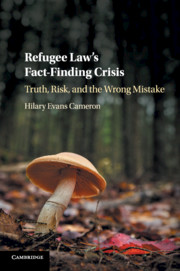Crossref Citations
This Book has been
cited by the following publications. This list is generated based on data provided by Crossref.
Purkey, Anna
2022.
Vulnerability and the Quest for Protection: A Review of Canadian Migration Case Law.
Laws,
Vol. 11,
Issue. 2,
p.
20.
Anderson, Melissa Mary
and
Soennecken, Dagmar
2022.
Locating the Concept of Vulnerability in Canada’s Refugee Policies at Home and Abroad.
Laws,
Vol. 11,
Issue. 2,
p.
25.
Verhaeghe, Loes
Jacobs, Marie
and
Maryns, Katrijn
2023.
Discursive Tensions of Credibility and Performance in Assessing Lesbian Refugee Claims for International Protection.
Journal of International Migration and Integration,
Vol. 24,
Issue. S4,
p.
769.
Durojaye, Ebenezer
Nanima, Robert Doya
Idowu-Ojo, Abiola
and
Mirugi-Mukundi, Gladys
2023.
Realising Socio-Economic Rights of Refugees and Asylum Seekers in Africa.
p.
23.
Clermont, Kevin M.
2024.
A General Theory of Evidence and Proof.
Vol. 148,
Issue. ,
p.
163.
Ramogwebo, Theodorah
Hlongwane, Jeniffer Shalati
Bhanye, Johannes
and
Matamanda, Abraham
2024.
Doing Fieldwork Among Hard-To-Reach Populations: An Account of Local Female Researchers Studying Foreign Migrants in Downtown Bloemfontein, South Africa.
International Journal of Qualitative Methods,
Vol. 23,
Issue. ,
Rehaag, Sean
2024.
Claim Types in Canada’s Refugee Determination System.
Refuge: Canada's Journal on Refugees,
Vol. 40,
Issue. 1,
p.
1.
Alshoubaki, Wa’ed
2024.
Navigating Integration Policies of Forced Migration in the United States.
p.
95.
Purkey, Anna
Nakache, Delphine
Yousuf, Biftu
and
Sagay, Christiana
2025.
Between Protection and Harm.
p.
189.



